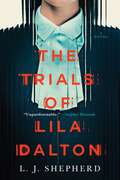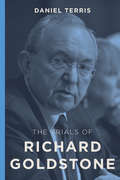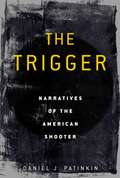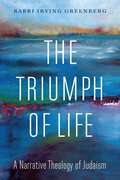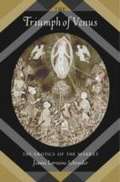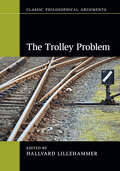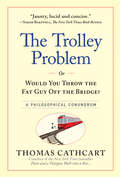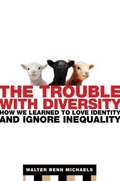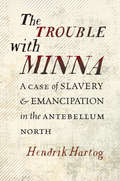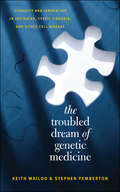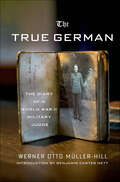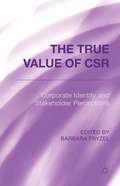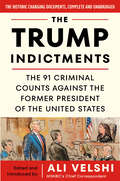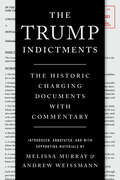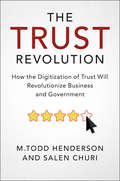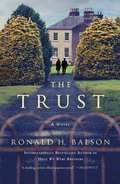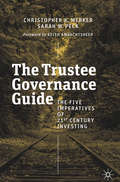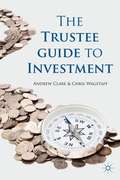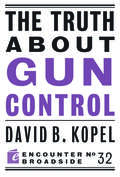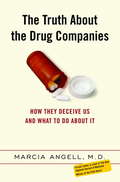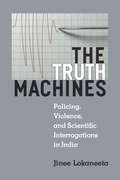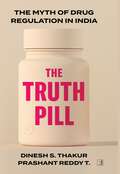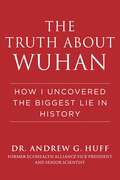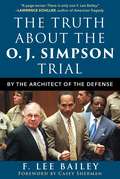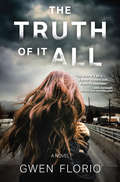- Table View
- List View
The Trials of Lila Dalton: A Novel
by L.J. Shepherd"A wonderfully ambitious book that never runs out of ideas or surprises." —Stuart Turton, bestselling author of The Last Murder at the End of the World and The 7 ½ Deaths of Evelyn HardcastleI look up to find twelve strangers staring back at me… and I realize I'm the one they're waiting for.Lila Dalton has no memory of how she came to be in this courtroom; no memory of how she got to the courthouse at all, or why she's facing a jury who seems to be waiting for her. The man on trial is accused of mass murder, and she's his lawyer, but she can't remember any details of the case. She can't remember anything… Stranded on an island in the Atlantic Ocean where the most serious crimes are tried, Lila has to prove her client's innocence if she wants to go home. But how can she solve this case when she's not sure she can trust anything around her, including her own memory?The Trials of Lila Dalton is a twisty, unexpected locked-room mystery that follows one woman's race against time to find a killer, clear her own name, and escape the island that threatens to keep her trapped forever.
The Trials of Richard Goldstone
by Daniel TerrisIn June 2009, Richard Goldstone was a global hero, honored by the MacArthur Foundation for its prize in international justice. Four months later, he was called a “quisling” and compared to some of the worst traitors in human history. Why? Because this champion of human rights and international law chose to apply his commitments to fairness and truth to his own community. The Trials of Richard Goldstone tells the story of this extraordinary individual and the price he paid for his convictions. It describes how Goldstone, working as a judge in apartheid South Africa, helped to undermine this unjust system and later, at Nelson Mandela’s request, led a commission that investigated cases of racial violence and intimidation. It also considers the international renown he received as the chief United Nations prosecutor for war crimes committed in Rwanda and the former Yugoslavia, the first tribunals to try political and military leaders on charges of genocide. Finally, it explores how Goldstone became a controversial figure in the wake of the Jewish jurist’s powerful, but flawed, investigation of Israel for alleged war crimes in Gaza. Richard Goldstone’s dramatic life story reveals that even in a world rife with prejudice, nationalism, and contempt for human rights, one courageous man can advance the cause of justice.
The Trigger: Narratives of the American Shooter
by Daniel J. PatinkinSix moving profiles reveal the complex realities behind gun violence in the United States. These are the stories of the shooters.In South Carolina, a young man embarks on a life of crime that culminates in a drug-related shooting and decades in prison; in Chicago, an off-duty police officer engages in a shootout with a murderous gunman, saving a fellow patrolman; in rural Tennessee, a troubled teenager shoots her abusive father in his sleep. The Trigger recounts the dramatic life stories of six individuals who have shot someone in America.In 2017, over 15,000 were killed and over 31,000 were injured by gunfire. Faced with these desensitizing statistics, one easily forgets that each incident is perpetrated by a living, feeling human being who has walked a unique path. The causes and consequences of these violent acts are often far more complicated than one might expect.Author Daniel J. Patinkin exhaustively interviewed each of six shooters about their life experiences and about the unique circumstances that compelled them to use a firearm against another person. The result is a series of profound narratives that is sure to distress and challenge the reader, but also, perhaps, to provide enlightenment and inspiration.
The Triumph of Life: A Narrative Theology of Judaism
by Rabbi Irving (Yitz) GreenbergThe Triumph of Life is Rabbi Irving Greenberg&’s magnum opus—a narrative of the relationship between God and humanity as expressed in the Jewish journey through modernity, the Holocaust, the creation of Israel, and the birth of Judaism&’s next era. Greenberg describes Judaism&’s utopian vision of a world created by a God who loves life, who invites humans to live on the side of life, and who enables the forces of life to triumph over death. The Bible proclaims our mission of tikkun olam, repairing the world, such that every human image of God is sustained in the fullness of our dignity. To achieve this ideal, Judaism offers the method of covenant—a realistic, personal, incremental partnership between God and humanity across generations in which human beings grow ever more responsible for world repair. Greenberg calls on us to redirect humanity&’s unprecedented power in modernity to overcome poverty, oppression, inequality, sickness, and war. The work of covenant requires an ethic of power—one that advances life collaboratively and at a human pace—so that the Jewish people and all humanity can bring the world toward the triumph of life.
The Triumph of Venus: The Erotics of the Market
by Jeanne Lorraine SchroederIn this ambitious and innovative work, Professor Schroeder applies Hegelian philosophy and Lacanian psychoanalysis, as well as classical mythologies, to argue for a reinterpretation of our understanding of economic markets.
The Trolley Problem (Classic Philosophical Arguments)
by Hallvard LillehammerThe Trolley Problem is one of the most intensively discussed and controversial puzzles in contemporary moral philosophy. Over the last half-century, it has also become something of a cultural phenomenon, having been the subject of scientific experiments, online polls, television programs, computer games, and several popular books. This volume offers newly written chapters on a range of topics including the formulation of the Trolley Problem and its standard variations; the evaluation of different forms of moral theory; the neuroscience and social psychology of moral behavior; and the application of thought experiments to moral dilemmas in real life. The chapters are written by leading experts on moral theory, applied philosophy, neuroscience, and social psychology, and include several authors who have set the terms of the ongoing debates. The volume will be valuable for students and scholars working on any aspect of the Trolley Problem and its intellectual significance.
The Trolley Problem, or Would You Throw the Fat Guy Off the Bridge?: A Philosophical Conundrum
by Thomas CathcartA trolley is careering out of control. Up ahead are five workers; on a spur to the right stands a lone individual. You, a bystander, happen to be standing next to a switch that could divert the trolley, which would save the five, but sacrifice the one—do you pull it? Or say you’re watching from an overpass. The only way to save the workers is to drop a heavy object in the trolley’s path. And you’re standing next to a really fat man….This ethical conundrum—based on British philosopher Philippa Foot’s 1967 thought experiment—has inspired decades of lively argument around the world. Now Thomas Cathcart, coauthor of the New York Times bestseller Plato and a Platypus Walk into a Bar, brings his sharp intelligence, quirky humor, and gift for popularizing serious ideas to “the trolley problem.” Framing the issue as a possible crime that is to be tried in the Court of Public Opinion, Cathcart explores philosophy and ethics, intuition and logic. Along the way he makes connections to the Utilitarianism of Jeremy Bentham, Kant’s limits of reason, St. Thomas Aquinas’s fascinating Principle of Double Effect, and more.Read with an open mind, this provocative book will challenge your deepest held notions of right and wrong. Would you divert the trolley? Kill one to save five? Would you throw the fat man off the bridge?
The Trouble With Diversity: How We Learned to Love Identity and Ignore Inequality
by Walter Benn MichaelsA brilliant assault on our obsession with every difference except the one that really matters - the difference between rich and poor If there's one thing Americans agree on, it's the value of diversity. Our corporations vie for slots in the Diversity Top 50, our universities brag about minority recruiting, and every month is Somebody's History Month. But in this provocative new book, Walter Benn Michaels argues that our enthusiastic celebration of "difference" masks our neglect of America's vast and growing economic divide. Affirmative action in schools has not made them more open, it's just guaranteed that the rich kidscome in the appropriate colors. Diversity training in the workplace has not raised anybody's salary (except maybe the diversity trainers') but it has guaranteed that when your job is outsourced, your culture will be treated with respect. With lacerating prose and exhilarating wit, Michaels takes on the many manifestations of our devotion to diversity, from companies apologizing for slavery, to a college president explaining why there aren't more women math professors, to the codes of conduct in the new "humane corporations. " Looking at the books we read, the TV shows we watch, and the lawsuits we bring, Michaels shows that diversity has become everyone's sacred cow precisely because it offers a false vision of social justice, one that conveniently costs us nothing. The Trouble with Diversity urges us to start thinking about real justice, about equality instead of diversity. Attacking both the right and the left, it will be the most controversial political book of the year.
The Trouble with Minna: A Case of Slavery and Emancipation in the Antebellum North
by Hendrik HartogIn this intriguing book, Hendrik Hartog uses a forgotten 1840 case to explore the regime of gradual emancipation that took place in New Jersey over the first half of the nineteenth century. In Minna's case, white people fought over who would pay for the costs of caring for a dependent, apparently enslaved, woman. Hartog marks how the peculiar language mobilized by the debate—about care as a "mere voluntary courtesy"—became routine in a wide range of subsequent cases about "good Samaritans." Using Minna's case as a springboard, Hartog explores the statutes, situations, and conflicts that helped produce a regime where slavery was usually but not always legal and where a supposedly enslaved person may or may not have been legally free.In exploring this liminal and unsettled legal space, Hartog sheds light on the relationships between moral and legal reasoning and a legal landscape that challenges simplistic notions of what it meant to live in freedom. What emerges is a provocative portrait of a distant legal order that, in its contradictions and moral dilemmas, bears an ironic resemblance to our own legal world.
The Troubled Dream of Genetic Medicine: Ethnicity and Innovation in Tay-Sachs, Cystic Fibrosis, and Sickle Cell Disease
by Keith Wailoo Stephen PembertonWinner of the History of Science category of the Professional and Scholarly Publishing Awards given by the Association of American PublishersWhy do racial and ethnic controversies become attached, as they often do, to discussions of modern genetics? How do theories about genetic difference become entangled with political debates about cultural and group differences in America? Such issues are a conspicuous part of the histories of three hereditary diseases: Tay-Sachs, commonly identified with Jewish Americans; cystic fibrosis, often labeled a "Caucasian" disease; and sickle cell disease, widely associated with African Americans. In this captivating account, historians Keith Wailoo and Stephen Pemberton reveal how these diseases—fraught with ethnic and racial meanings for many Americans—became objects of biological fascination and crucibles of social debate. Peering behind the headlines of breakthrough treatments and coming cures, they tell a complex story: about different kinds of suffering and faith, about unequal access to the promises and perils of modern medicine, and about how Americans consume innovation and how they come to believe in, or resist, the notion of imminent medical breakthroughs. With Tay-Sachs, cystic fibrosis, and sickle cell disease as a powerful backdrop, the authors provide a glimpse into a diverse America where racial ideologies, cultural politics, and conflicting beliefs about the power of genetics shape disparate health care expectations and experiences.
The True German: The Diary of a World War II Military Judge
by Werner Otto Müller-HillA recently discovered diary held by a German military judge from 1944 to 1945 sheds new light on anti-Hitler sentiments inside the German army.Werner Otto Müller-Hill served as a military judge in the Werhmacht during World War II. From March 1944 to the summer of 1945, he kept a diary, recording his impressions of what transpired around him as Germany hurtled into destruction—what he thought about the fate of the Jewish people, the danger from the Bolshevik East once an Allied victory was imminent, his longing for his home and family and, throughout it, a relentless disdain and hatred for the man who dragged his beloved Germany into this cataclysm, Adolf Hitler and the Nazi party. Müller-Hill calls himself a German nationalist, the true Prussian idealist who was there before Hitler and would be there after. Published in Germany and France, Müller-Hill's diary The True German has been hailed as a unique document, praised for its singular candor and uncommon insight into what the German army was like on the inside. It is an extraordinary testament to a part of Germany's people that historians are only now starting to acknowledge and fills a gap in our knowledge of WWII.
The True Value of CSR
by Barbara FryzelBy considering the importance of Corporate Social Responsibility (CSR) as a business paradigm but also as a growing scepticism about it's outcomes, The True Value of CSR answers questions about true value behind this concept, motivations of firms embedding CSR in their core strategies and a capacity of CSR to make a real difference on the market.
The Trump Indictments: The 91 Criminal Counts Against the Former President of the United States
by Ali VelshiEdited and introduced by MSNBC’s Ali Velshi, The Trump Indictments collects the complete charging documents brought by the Department of Justice and the Fulton County (GA) and Manhattan (NY) district attorneys—a riveting and shocking narrative of the former president’s alleged crimes and conspiracies.“Despite having lost, the defendant was determined to remain in power…” So reads the compelling introduction to the Department of Justice’s second indictment against Donald Trump—one of four criminal cases brought against the former president. Purposely crafted as narratives to be read by the public, these documents are among the most consequential in American history, forcing the country to grapple with the critical question: does justice apply to the most powerful?Edited and with an introduction by MSNBC host Ali Velshi, The Trump Indictments collects all the charging documents against Trump and his co-defendants, providing critical insight on a decisive moment in our history. It is required reading as the country faces a pivotal reckoning—both in our justice system and at the ballot box.United States of America v. Donald J. Trump: 4 felony counts for conspiring to overturn the 2020 U.S. presidential election resultsUnited States of America v. Donald J. Trump, et al: 40 felony counts for mishandling of classified documentsThe State of Georgia v. Donald John Trump, et al.: 13 felony counts for leading a “criminal organization” that conspired to overturn Georgia’s electionPeople of the State of New York v. Trump: 34 felony counts concerning hush money payments made before the 2016 U.S. presidential election
The Trump Indictments: The Historic Charging Documents With Commentary
by Andrew Weissmann Melissa MurrayCollecting the four unprecedented indictments against Donald Trump, this essential volume features extensive commentary by NYU law professors and MSNBC contributors Melissa Murray and Andrew Weissmann. <p><p> In the long span of American history, Donald Trump is the first former president to face criminal indictment. He is the subject of a series of explosive charges across four cases: the January 6 case brought by Special Counsel Jack Smith; the election interference case in Georgia; the classified documents case also brought by Special Counsel Jack Smith; and the "hush money" case in New York. The Trump Indictments includes: • An introduction offering historical background and international comparisons for criminal charges against a former political leader. • The four indictments with annotations throughout, including insider notes from an eminent scholar (Murray) and a former federal prosecutor (Weissmann). • A cast of characters, from Trump and his alleged co-conspirators to notable Proud Boys and Oath Keepers who face prison sentences as a result of related January 6 cases. • A timeline that brings together in one place the critical events that led to the four indictments. A necessary handbook for anyone following the trials in 2024, The Trump Indictments will endure as an indispensable record of a democracy at the crossroads. <p> <b>New York Times Bestseller</b>
The Trust Revolution: How the Digitization of Trust Will Revolutionize Business and Government
by M.Todd Henderson Salen ChuriWhile conventional wisdom dictates that people's trust – in the government, in corporations, in each other - is at a historic low, the rise of the internet is offering new ways to rehabilitate and strengthen trust. Uber is probably the best example of a new company that, on the surface, allows individuals with smartphones to get rides with strangers, but at a deeper level is in the business of trust. In The Trust Revolution, M. Todd Henderson and Salen Churi trace the history of innovation and trust, linking companies such as Uber with medieval guilds, early corporations, self-regulatory organizations, and New-Deal era administrative agencies. This book should be read by anyone who wants to understand how trust - and its means of creation - has the potential not only to expand opportunities for human cooperation, but also to reduce the size and scope of government and corporate control over our lives.
The Trust: A Novel (Liam Taggart And Catherine Lockhart Ser. #4)
by Ronald H. BalsonThe newest novel from Ronald H. Balson, the international bestselling author of Once We Were Brothers, finds private investigator Liam Taggart returning to his childhood home for an uncle's funeral, only to discover his death might not have been natural.When his uncle dies, Liam Taggart reluctantly returns to his childhood home in Northern Ireland for the funeral—a home he left years ago after a bitter confrontation with his family, never to look back. But when he arrives, Liam learns that not only was his uncle shot to death, but that he’d anticipated his own murder: In an astonishing last will and testament, Uncle Fergus has left his entire estate to a secret trust, directing that no distributions be made to any person until the killer is found. Did Fergus know, but refuse to name, his killer? Was this a crime of revenge, a vendetta leftover from Northern Ireland’s bloody sectarian war? After all, the Taggarts were deeply involved in the IRA. Or is it possible that the killer is a family member seeking Fergus’s estate? Otherwise, why postpone distributions to the heirs? Most menacingly, does the killer now have his sights on other family members? As his investigation draws Liam farther and farther into the past he has abandoned, he realizes he is forced to reopen doors long ago shut and locked. Now, accepting the appointment as sole trustee of the Fergus Taggart Trust, Liam realizes he has stepped into the center of a firestorm.
The Trustee Governance Guide: The Five Imperatives of 21st Century Investing
by Christopher K. Merker Sarah W. PeckMore than 80% of the financial assets in the United States fall under the purview of a trustee. That's a big responsibility for an estimated 1% (around 1.5 million people) of the U.S. working population charged with overseeing investments for millions and millions of beneficiaries, public sector, and non-profit organizations. In a world proliferated by investment products, increasingly dominated by indexes, faced—particularly in the pension world—with increasing liabilities, more regulation, and a growing number of social and sustainability objectives, what's a trustee to do?The Trustee Governance Guide is here to help guide today’s board trustee through the brave new world of 21st century investing. The book focuses on the critical aspects of the Five Imperatives: Governance, Knowledge, Diversification, Discipline, and Impact. Based on more than a decade of research, practice, and discussions with many key decision makers and influencers across the industry, this book addresses the many topics related to better governance, greater mission-driven financial performance, and impact. The questions the book addresses include: · What is good governance, how do we know it when we see it, and why does it matter?· How much knowledge is necessary to be a competent board member?· How big should my endowment be?· What are the key elements of a diversified portfolio?· How much does cost matter?· What's the difference between socially responsible and ESG investing?· Can I focus on sustainability and still be a good fiduciary? This book provides a way for boards to improve and benchmark their own governance performance alongside their peers, and uniquely covers related investment topics in each chapter.
The Trustee Guide to Investment
by Andrew Clare Chris WagstaffThe Trustee Guide to Investment is a unique and refreshingly practical guide to the expanding range of markets, investments, tools and techniques to which pension scheme trustees must now become familiar.
The Truth About Gun Control
by David B KopelWho is sovereign in the United States? Is it the people themselves, or is it an elite determined to rule citizens who are seen as incapable of making choices about their own lives? This is the central question in the American gun-control debate.In this Broadside, David Kopel explains why the right to keep and bear arms has always been central to the American identity - and why Americans have always resisted gun control. The American Revolution was sparked by British attempts to confiscate guns. After the Civil War, the U.S. changed the Constitution to defeat the nation's first gun-control organization, the Ku Klux Klan. When Hitler and Stalin demonstrated how gun registration paves the way for gun confiscation, which paves the way for genocide, Americans resolved to make sure it never happens here.Gun control is not an issue of left vs. right or urban vs. rural. The right to bear arms is crucial to prevent large-scale tyranny by criminal governments and small-scale tyranny by ordinary criminals - and to protect our Constitution.
The Truth About the Drug Companies: How They Deceive Us and What to Do About It
by Marcia AngellDuring her two decades at The New England Journal of Medicine, Dr. Marcia Angell had a front-row seat on the appalling spectacle of the pharmaceutical industry. She watched drug companies stray from their original mission of discovering and manufacturing useful drugs and instead become vast marketing machines with unprecedented control over their own fortunes. She saw them gain nearly limitless influence over medical research, education, and how doctors do their jobs. She sympathized as the American public, particularly the elderly, struggled and increasingly failed to meet spiraling prescription drug prices. Now, in this bold, hard-hitting new book, Dr. Angell exposes the shocking truth of what the pharmaceutical industry has become–and argues for essential, long-overdue change.<P> Currently Americans spend a staggering $200 billion each year on prescription drugs. As Dr. Angell powerfully demonstrates, claims that high drug prices are necessary to fund research and development are unfounded: The truth is that drug companies funnel the bulk of their resources into the marketing of products of dubious benefit. Meanwhile, as profits soar, the companies brazenly use their wealth and power to push their agenda through Congress, the FDA, and academic medical centers.<P> Zeroing in on hugely successful drugs like AZT (the first drug to treat HIV/AIDS), Taxol (the best-selling cancer drug in history), and the blockbuster allergy drug Claritin, Dr. Angell demonstrates exactly how new products are brought to market. Drug companies, she shows, routinely rely on publicly funded institutions for their basic research; they rig clinical trials to make their products look better than they are; and they use their legions of lawyers to stretch out government-granted exclusive marketing rights for years. They also flood the market with copycat drugs that cost a lot more than the drugs they mimic but are no more effective.<P> The American pharmaceutical industry needs to be saved, mainly from itself, and Dr. Angell proposes a program of vital reforms, which includes restoring impartiality to clinical research and severing the ties between drug companies and medical education. Written with fierce passion and substantiated with in-depth research, The Truth About the Drug Companies is a searing indictment of an industry that has spun out of control.
The Truth Machines: Policing, Violence, and Scientific Interrogations in India (Law, Meaning, And Violence)
by Jinee LokaneetaUsing case studies and the results of extensive fieldwork, this book considers the nature of state power and legal violence in liberal democracies by focusing on the interaction between law, science, and policing in India. The postcolonial Indian police have often been accused of using torture in both routine and exceptional criminal cases, but they, and forensic psychologists, have claimed that lie detectors, brain scans, and narcoanalysis (the use of “truth serum,” Sodium Pentothal) represent a paradigm shift away from physical torture; most state high courts in India have upheld this rationale. The Truth Machines examines the emergence and use of these three scientific techniques to analyze two primary themes. First, the book questions whether existing theoretical frameworks for understanding state power and legal violence are adequate to explain constant innovations of the state. Second, it explores the workings of law, science, and policing in the everyday context to generate a theory of state power and legal violence, challenging the monolithic frameworks about this relationship, based on a study of both state and non-state actors. Jinee Lokaneeta argues that the attempt to replace physical torture with truth machines in India fails because it relies on a confessional paradigm that is contiguous with torture. Her work also provides insights into a police institution that is founded and refounded in its everyday interactions between state and non-state actors. Theorizing a concept of Contingent State, this book demonstrates the disaggregated, and decentered nature of state power and legal violence, creating possible sites of critique and intervention.
The Truth Pill: The Myth of Drug Regulation in India
by Dinesh Singh Thakur Prashant Reddy ThikkavarapuSince 2004, when the fraud at Ranbaxy, the largest Indian pharmaceutical company at the time first came to light, the Indian pharmaceutical industry and clinical research organizations have been rocked by a series of scandals after investigations by American and European drug regulators. While the West has responded to concerns about quality of &“Made in India&” medicine by blocking exports from many Indian pharmaceutical companies, the Indian government responded not with regulatory reform but conspiracy theories about &“vested interests&” working against India. More worryingly, the Indian state has also turned a blind eye to a far more serious quality crisis in its domestic pharmaceutical market. At times, these quality issues manifest themselves in the deaths of Indian citizens as happened in early 2020 when 11 children died in Jammu because of adulterated cough syrup. On other occasions, a dodgy drug approval process has led to the Indian regulator approving sales of drugs that have never been approved by regulators in the developed markets. The result is not just poor health outcomes but outsize profits for pharmaceutical companies manufacturing medicines that have never been validated through scientifically rigorous clinical trials for therapeutic evidence. These twin crises, in both the domestic and export markets, is because India has either outdated regulations or no regulations in some areas. Even the outdated regulations are enforced with kids gloves by drug inspectors and judicial magistrates who are ready to forgive even those whose drugs are found to contain barely any active ingredient or dangerously high levels of bacterial endotoxins. In a race for growth of the pharmaceutical industry, the Indian state has sacrificed scientific rigour and ignored the basic principles of public health. Given India&’s position as the pharmacy of the developing world, the failure of the Indian state is a problem for not just India but most of the developing world. This timely, important and compelling book based on deep research, questions and analyzes the actions of the institutions that are responsible for the safety and efficacy of the Indian drug supply in the context of the historical evolution of the Drugs Act 1940 from pre-Independence India to the present day. The future of Indian public health lies in responding to the issues raised in this book.
The Truth about Wuhan: How I Uncovered the Biggest Lie in History
by Dr. Andrew G. HuffShocking new insider information that shows what really happened in Wuhan, China, at the start of the COVID-19 outbreak and in the ensuing cover-up. The day that Dr. Andrew G. Huff left his senior scientist and vice president role at EcoHealth Alliance was one of the happiest days of his life due to the corruption he had witnessed at the organization. However, he never thought working there would be of any great consequence to the future. He was wrong. Because, as an EcoHealth Alliance insider, Dr. Huff had had a ringside seat to one of the biggest cover-ups in history. The Truth about Wuhan contains new research and a breakdown of how and why the development of COVID-19 in the United States and China was supported by the US government to collect intelligence on laboratories in China. Dr. Huff, an expert in the fields of bioterrorism and bio warfare, is a whistleblower who will show why the reasons the lab leak was covered up are incorrect. He worked on the classified research side of the program as a US government scientist. He knows the real how and why COVID-19 emerged. Besides exposing the conspiracy and cover-up, Dr. Huff also puts forth policy solutions and recommendations to prevent a lab leak virus from plaguing the world again. The Truth about Wuhan simply explains the complexity of the system that led to COVID-19&’s emergence; how the medical industrial complex grew and became entrenched in gain of function work after 9/11; why EcoHealth Alliance was the (almost) perfect intelligence collection cover; the policy actions and decision-making process as to why the United States government engaged in the COVID cover-up; how and why the United States swapped biotechnology with China and biomedical corporations; and the incentives for each of the actors or governments to engage and coordinate a global cover-up of COVID-19 origins. The Truth about Wuhan also shows how and why Dr. Anthony Fauci is intricately involved in the COVID cover-up; how scientists like EcoHealth Alliance president and CEO Dr. Peter Daszak rose to power and used their influence to corrupt science and the COVID origin investigation; and how the intelligence community likely orchestrated the cover-up with Dr. Anthony Fauci. Dr. Huff also provides personal harrowing accounts of how the US government waged a psychological operation against him to prevent him from speaking out. COVID-19 is the biggest lie, scandal, and intelligence failure in US history, and Dr. Andrew G. Huff is stepping out of the shadows to share his insider story about this failure that led to millions of deaths around the world.
The Truth about the O.J. Simpson Trial: By the Architect of the Defense
by F. Lee BaileyThe Definitive Account of the O.J. Simpson Trial, by Legendary Defense Attorney F. Lee BaileyIt was called &“The Trial of the Century.&” Beloved football sensation, O.J. Simpson was famous for his prowess on the field, his good looks, and his charm. But all that changed the night his ex-wife Nicole Brown Simpson and her friend Ron Goldman were brutally slaughtered in her front yard late at night on June 12, 1994. The media circus that consumed the news cycle for the next eighteen months would forever change the world's opinion of O.J. Simpson, despite the fact that the jury, after nearly a year of sequestration, came to their decision in just a few hours: Not Guilty. Although at least a dozen books have been written about the O.J. Simpson trial, from every possible perspective from provocative to sensationalistic, The Truth About the O.J. Simpson Trial is the most revealing because the writer was the Architect of the Defense. Bailey, shows definitively why the jury was correct in finding that the timeline of the evening made Simpson&’s presence at the murder scene impossible, which eclipses the question &“Did he do it?&” and establishes that he simply could not have done it. This book reveals shocking evidence of police corruption, mishandling of blood samples and other materials that formed the basis of the prosecution's case. Bailey includes convincing evidence that was not presented at the trial—including interviews, forensic results, and revelations about the case that have since come to light. Scathing, controversial, and, yes, entertaining, The Truth About the O.J. Simpson Trial will be read and studied by anyone interested in defending the innocent, the history of law enforcement in America, students of the Law, and all those who are still obsessed with &“The Trial of the Century.&”
The Truth of it All: A Novel
by Gwen FlorioA hot-button legal case fuels a community's smoldering hostility--but the dark secret at its heart could set the town ablaze. Public defender Julia Geary moves through life in simmering resentment--at her husband, a soldier killed in Iraq, leaving her a single mother; at her low-paying job; and at her overbearing mother-in law, whose home she shares. She longs for a breakout case, and it arrives when members of the high school soccer team report seeing a teammate--Iraqi refugee Sami Mohammed--assaulting a girl in the locker room.In a town where animosity against refugees has already reached a fever pitch, Julia throws all her energy into Sami's defense. She finds an ally in high school principal Dom Parrish, who believes Sami is innocent, and the case suddenly turns red hot.Then she begins receiving vicious threats against her family, and a senseless act of violence leaves Sami in a coma. And finally, a crop of new evidence emerges that points to the town's most prominent citizens and pits Julia against powerful forces set on burying the truth once and for all.If Sami survives and Julia can prove him innocent, it will be the case of a lifetime. But now it's her life that's on the line.
